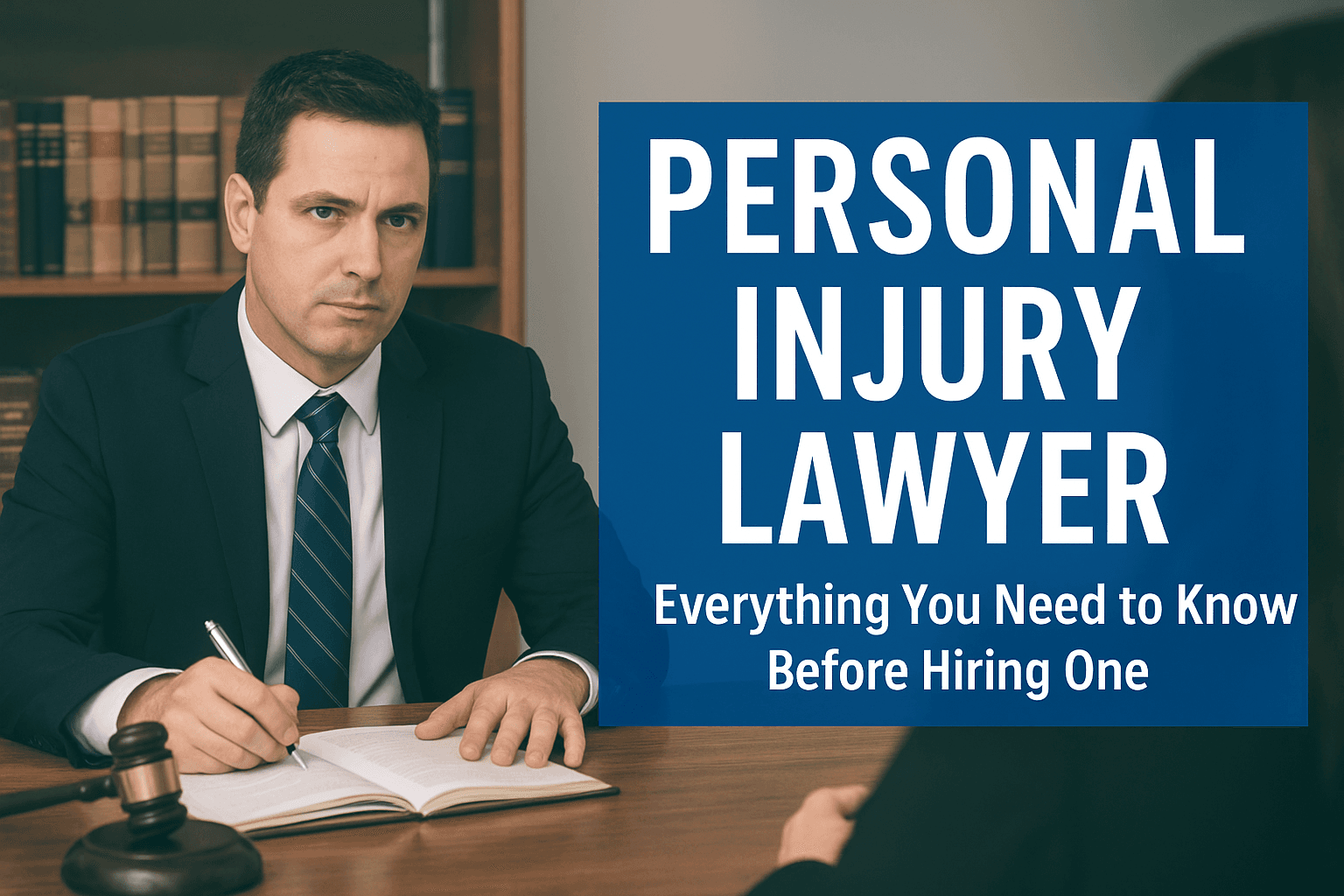
Personal Injury Lawyer: Everything You Need to Know Before Hiring One
Accidents can happen at any time—on the road, at work, or even while shopping in a store. When injuries occur due to someone else’s negligence, victims may be entitled to compensation. This is where a personal injury lawyer steps in. These legal professionals specialize in helping injured individuals pursue claims, negotiate settlements, and win damages in court.
In this guide, we’ll explain who personal injury lawyers are, what they do, when you might need one, and how to choose the right attorney. We’ll also include references to reliable .gov and .edu resources that can help you better understand personal injury law in the U.S.
What Is a Personal Injury Lawyer?
A personal injury lawyer is an attorney who provides legal representation to individuals injured as a result of another party’s negligence, carelessness, or intentional wrongdoing. Their goal is to help clients recover financial compensation for medical bills, lost wages, pain and suffering, and other damages.
Common Areas Personal Injury Lawyers Cover
- Car, truck, and motorcycle accidents
- Slip and fall accidents (premises liability)
- Workplace injuries
- Medical malpractice
- Defective products (product liability)
- Wrongful death cases
Personal injury lawyers work under tort law, which governs civil wrongs and damages. They often work on a contingency fee basis, meaning they only get paid if they win or settle the case.
When Do You Need a Personal Injury Lawyer?
You should consider hiring a personal injury lawyer if:
- You suffered severe injuries that require ongoing medical care.
- Your injury caused lost wages or reduced earning capacity.
- The insurance company is denying or undervaluing your claim.
- Multiple parties are involved, making the case more complex.
- Negligence is disputed, and you need evidence to prove fault.
For example, if you are injured in a car accident caused by a distracted driver, the at-fault driver’s insurance may try to minimize your claim. A lawyer ensures you’re not pressured into accepting less than you deserve.
Steps Personal Injury Lawyers Take
1. Case Evaluation
The lawyer reviews your accident details, medical records, and evidence to determine whether you have a valid claim.
2. Investigation and Evidence Gathering
They collect police reports, witness statements, surveillance footage, and expert testimony to strengthen your case.
3. Filing a Claim
The lawyer submits claims to the responsible party’s insurance company and negotiates on your behalf.
4. Settlement Negotiation
Most personal injury cases settle out of court. Lawyers use their negotiation skills to secure the best possible compensation.
5. Litigation
If settlement fails, the lawyer files a lawsuit and represents you in court. They present evidence, question witnesses, and argue before a judge or jury.
How Much Compensation Can You Receive?
Compensation depends on the severity of injuries, financial losses, and emotional suffering. Damages may include:
- Economic damages – Medical expenses, rehabilitation costs, lost wages.
- Non-economic damages – Pain, suffering, emotional distress.
- Punitive damages – In rare cases, courts award additional damages to punish reckless or malicious behavior.
The U.S. Courts website provides an overview of civil cases, including damages (uscourts.gov).
Personal Injury Law and Government Oversight
Several government agencies regulate aspects of personal injury law and consumer protection:
- Centers for Disease Control and Prevention (CDC) – Provides statistics on injuries and accidents (cdc.gov).
- Occupational Safety and Health Administration (OSHA) – Oversees workplace safety and injuries (osha.gov).
- National Highway Traffic Safety Administration (NHTSA) – Tracks vehicle accident statistics and safety laws (nhtsa.gov).
- U.S. Courts – Explains the civil litigation process and provides resources for plaintiffs (uscourts.gov).
Educational Resources for Understanding Personal Injury Law
- Cornell Law School Legal Information Institute (LII) – Offers free access to tort law explanations and personal injury case law (law.cornell.edu).
- Harvard Law School – Case Studies – Publishes case examples on personal injury and tort litigation.
- University of Minnesota Law Library – Provides guides on injury law and civil justice research.
These .edu resources are excellent for those who want deeper legal insights.
How to Choose the Right Personal Injury Lawyer
When hiring an attorney, consider:
- Experience – Do they specialize in personal injury cases similar to yours?
- Reputation – Check reviews, testimonials, and disciplinary records.
- Resources – Large firms may have more access to investigators and expert witnesses.
- Communication – Choose a lawyer who explains the process clearly.
- Fee Structure – Most personal injury lawyers charge contingency fees (typically 25–40% of the settlement).
A consultation is often free, allowing you to evaluate whether the lawyer is a good fit.
Benefits of Hiring a Personal Injury Lawyer
- Stronger Negotiations – Lawyers understand insurance company tactics.
- Reduced Stress – They handle paperwork, deadlines, and communications.
- Better Outcomes – Research shows plaintiffs with lawyers receive higher settlements.
- Trial Readiness – If your case goes to court, a lawyer ensures you are fully prepared.
Conclusion
A personal injury lawyer is a vital advocate for individuals harmed by negligence, defective products, workplace accidents, or unsafe conditions. They ensure injured people receive fair compensation for medical bills, lost wages, and pain and suffering.
By leveraging government resources like OSHA.gov, CDC.gov, and educational sources such as Cornell Law School, you can better understand your rights before pursuing a claim.
Hiring the right lawyer not only improves your chances of success but also gives you peace of mind during a difficult recovery.